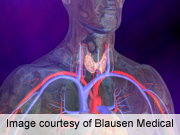
TUESDAY, Nov. 27 (HealthDay News) — People with an overactive thyroid (hyperthyroidism) are at increased risk for a common and potentially dangerous heart rhythm disorder called atrial fibrillation, a large study suggests.
The researchers said their findings point to the value of long-term screening for atrial fibrillation in people with hyperthyroidism, which causes many of the body’s functions to speed up.
About one in 100 women and one in 1,000 men develop hyperthyroidism at some point in their lives and the condition can occur at any age.
The study, led by Christian Selmer of Gentofte University Hospital, in Hellerup, Denmark, included more than 586,000 Danes who had undergone a thyroid function blood test between 2000 and 2010. During an average 5.5 years of follow-up, 3 percent of the patients were diagnosed with atrial fibrillation and 53 percent of those patients were women.
However, compared to patients with normal thyroid function, those with subclinical (early stage) hyperthyroidism had a 30 percent increased risk of atrial fibrillation, while those with high-normal thyroid function had a 12 percent increased risk. People with an underactive thyroid (hypothyroidism) had a lower risk of atrial fibrillation than those with normal thyroid function.
While this study found a close association between thyroid activity and atrial fibrillation, it does not prove a direct cause-and-effect link, the researchers wrote. They added that their findings “support long-term screening for atrial fibrillation in patients with thyroid disease.”
Two experts in the United States said the study raises new questions for doctors and patients.
“While it is now well-known fact that patients with hyperthyroidism have increased risk of atrial fibrillation, this study extends that finding to patients with subclinical hyperthyroidism,” said Dr. Sripal Bangalore, an assistant professor in the department of medicine at NYU Langone Medical Center, in New York City. “However, given that it is an observational study, it is difficult to attribute causal association even though there is strong biological plausibility for such association.”
Still, Dr. Suzanne Steinbaum, a preventive cardiologist at Lenox Hill Hospital, in New York City, agreed with the authors that “investigating for subclinical hyperthyroidism is essential to adequately assess the risk for atrial fibrillation [in patients] and to treat it before it becomes a cardiac issue.”
Bangalore believes that many more questions remain unanswered, however.
“Further studies are needed,” he said, “to evaluate the next step: What should be done for patients with subclinical hyperthyroidism to reduce the risk of atrial fibrillation, and whether treatment of subclinical hyperthyroidism would reduce this increased risk of atrial fibrillation? Up until that time, close follow-up of patients with subclinical hyperthyroidism for atrial fibrillation is warranted.”
The study was published online Nov. 27 in BMJ.
More information
The U.S. National Institute of Diabetes and Digestive and Kidney Diseases has more about hyperthyroidism.

